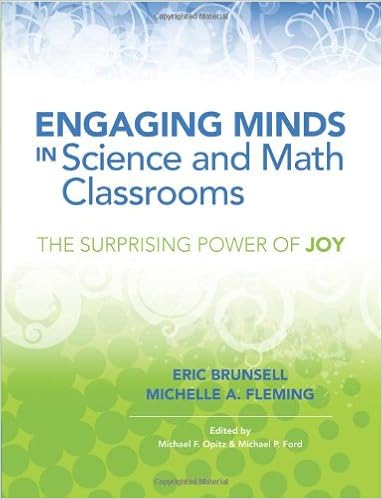
By Eric Brunsell
We elect, each day, even if we will flip scholars on or off to technological know-how and arithmetic in our school rooms.
Daily judgements approximately the way to comprise creativity, selection, and autonomy critical elements of engagement can construct scholars self-efficacy, continue them prompted, and increase their identities as scientists and mathematicians. during this e-book, Eric Brunsell and Michelle A. Fleming aid you practice the pleased studying framework brought in attractive Minds within the lecture room to guideline in technological know-how and mathematics.
Acknowledging that many scholars fairly ladies and scholars of colour don't see themselves as mathematicians and scientists, the authors offer a chain of recommended actions which are aligned with criteria and excessive expectancies to interact and encourage all newcomers. Given the present specialise in encouraging scholars to pursue technological know-how, expertise, engineering, and arithmetic (STEM) experiences, this publication is a great addition to each instructor s reference assortment.
Read or Download Engaging Minds in Science and Math Classrooms: The Surprising Power of Joy PDF
Best education & teaching books
Download e-book for iPad: Engaging Minds in Science and Math Classrooms: The by Eric Brunsell
We elect, on a daily basis, no matter if we will flip scholars on or off to technological know-how and arithmetic in our school rooms. day-by-day judgements approximately tips on how to contain creativity, selection, and autonomy critical parts of engagement can construct scholars self-efficacy, maintain them inspired, and boost their identities as scientists and mathematicians.
New PDF release: Poetic Inquiry II – Seeing, Caring, Understanding: Using
This quantity bargains a singular number of foreign works at the use of poetry in inquiry that transcends traditional disciplinary barriers. the purpose is to demonstrate an 'aesthetic circulation' in social sciences and specifically in healthiness and in schooling. the gathering builds a bridge among the humanities and healthiness and schooling via delivering cutting edge exemplars of use of poetry in social technological know-how learn and within the context of the numerous various disciplinary contexts.
Additional info for Engaging Minds in Science and Math Classrooms: The Surprising Power of Joy
Sample text
Students then convene in small groups to discuss the quiz and come to consensus on answers, using a different color of ink. 3. Finally, individually or in small groups, students use their textbook, notes, and other resources to verify answers in a third color of ink. indd 44 1/16/14 12:32 PM Impl em en t i n g J o y f u l L e a r n i n g i n S c i e n c e a n d Ma t h 45 at their level, even with the old stuff, the stuff we all claim is so important, that is, the ‘curriculum’” (p. 64). This does not mean that we have to turn our classrooms into video games with loud music and flashy graphics; as Prensky acknowledged, student engagement “depends much less on what they see than on what they do and learn” (p.
Indd 46 Create and implement a survey to determine the number of text messages that a sample of students in your school send each day. Create an estimate of the population mean and margin of error for your entire school. Students write descriptions for a collection of graphs. Students select a card from a deck (cards printed with fractions). They use cards from a second deck, consisting of fractions that can be added in different ways, to create the fraction from the first deck. Students use a digital camera or sketchbook and colored pencils to identify and name shapes in picture books.
Projects should include student annotation or narration that addresses whether and why each strategy worked, which supports student learning: “Monitoring and reflectModeling and teaching students to use ing during problem solving helps multiple strategies, in addition to supporting students think about what they are students’ ability to conceptualize principles, doing and why they are doing it, provides ELLs with repeated exposure to new and evaluate the steps they are taking necessary academic vocabulary.


